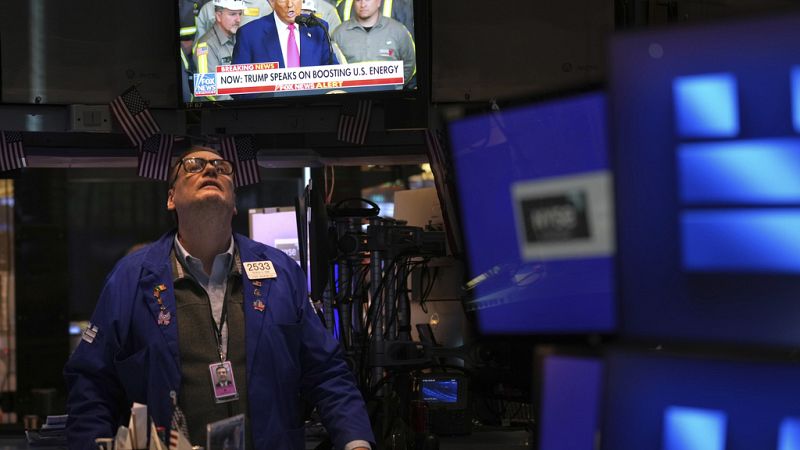
US markets surged in response to Trump backing down on his tariffs. The S&P 500 was up 7.8% in afternoon trading. It had been down earlier in the morning amid worries about Trump’s trade war and whether it would cause a recession, as economists fear.
However, it spiked immediately after Trump sent the social media post that investors had been waiting for. The Dow Jones Industrial Average was up 2,476 points, or 6.6%, as of 1:35 p.m. Eastern time, and the Nasdaq composite was 9% higher.
Investors have been desperate for Trump to ease up on his tariffs, which economists say could cause a global recession and increase inflation.
Trump posted on Truth Social that because “more than 75 Countries” had reached out to the US government for trade talks and have not retaliated in meaningful way “I have authorised a 90 day PAUSE, and a substantially lowered Reciprocal Tariff during this period, of 10%, also effective immediately.”
The 10% tariff was the baseline rate for most nations that went into effect on Saturday. It's meaningfully lower than the 20% tariff that Trump had set for goods from the European Union, 24% on imports from Japan and 25% on products from South Korea. Still, 10% would represent an increase in the tariffs previously charged by the U.S. government.
The announcement came after the global economy appeared to be in open rebellion against Trump's tariffs as they took effect Wednesday, a signal that the US president was not immune from market pressures.
Business executives were warning of a potential recession caused by his policies, some of the top US trading partners are retaliating with their own import taxes and the stock market is quivering after days of decline.
White House press secretary Karoline Leavitt said the walk back was part of some grand negotiating strategy by Trump.
“President Trump created maximum negotiating leverage for himself,” she said, adding that the news media "clearly failed to see what President Trump is doing here. You tried to say that the rest of the world would be moved closer to China, when in fact, we’ve seen the opposite effect the entire world is calling the United States of America, not China, because they need our markets.”
Markets remain volatile
But market pressures had been building for weeks ahead of Trump's move.
Particularly worrisome was that US government debt had lost some of its luster with investors, who usually treat Treasury notes as a safe haven when there's economic turbulence. Government bond prices had been falling, pushing up the interest rate on the 10-year US Treasury note to 4.45%. That rate eased after Trump's reversal.
Gennadiy Goldberg, head of US rates strategy at TD Securities, said before the announcement that markets wanted to see a truce in the trade disputes.
“Markets more broadly, not just the Treasury market, are looking for signs that a trade de-escalation is coming," he said. "Absent any de-escalation, it’s going to be difficult for markets to stabilise.”
John Canavan, lead analyst at the consultancy Oxford Economics, noted that while Trump said he changed course due to possible negotiations, he had previously indicated that the tariffs would stay in place.
“There have been very mixed messages on whether there would be negotiations," Canavan said. "Given what's been going on with the markets, he realized the safest thing to do is negotiate and put things on pause.”
Presidents often receive undue credit or blame for the state of the US economy as their time in the White House is subject to financial and geopolitical forces beyond their direct control.
But by unilaterally imposing tariffs, Trump is exerting extraordinary influence over the flow of commerce, creating political risks and pulling the market in different directions based on his remarks and social media posts. There still appear to be 25% tariffs on autos, steel and aluminum, with more imports set to be tariffed in the weeks ahead.
On CNBC, Delta Air Lines CEO Ed Bastian said the administration was being less strategic than it was during Trump's first term. His company had in January projected it would have its best financial year in history, only to scrap its expectations for 2025 due to the economic uncertainty.
“Trying to do it all at the same time has created chaos in terms of being able to make plans,” he said, noting that demand for air travel has weakened.
Before Trump's reversal, economic forecasters say his second term has had a series of negative and cascading impacts that could put the country into a downturn.
“Simultaneous shocks to consumer sentiment, corporate confidence, trade, financial markets as well as to prices, new orders and the labour market will tip the economy into recession in the current quarter,” said Joe Brusuelas, chief economist at the consultancy RSM.
Treasury Secretary Scott Bessent has previously said it could take months to strike deals with countries on tariff rates, and the administration has not been clear on whether the baseline 10% tariffs imposed on most countries will stay in place. But in an appearance on “Mornings with Maria,” Bessent said the economy would “be back to firing on all cylinders” at a point in the “not too distant future.”
He said there has been an "overwhelming" response by “the countries who want to come and sit at the table rather than escalate.” Bessent mentioned Japan, South Korea, and India. "I will note that they are all around China. We have Vietnam coming today,” he said.
What's not yet known is what Trump does with the rest of his tariff agenda. In a Tuesday night speech, he said taxes on imported drugs would happen soon.







